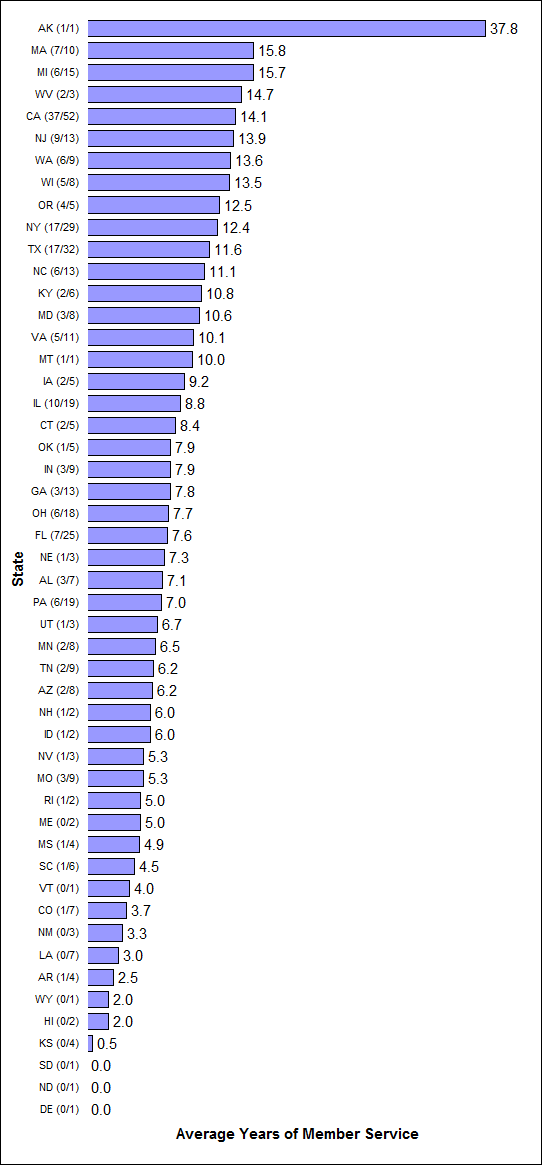Rep. Barney Frank (D-MA) announced today that he will not seek reelection in 2012, after 16 terms in the House. Massachusetts will also be losing Rep. John Olver (1st district), who announced his retirement last month after 10 terms in the House.
Representative Frank is the Ranking Member of the House Committee on Financial Services. Representative Olver is the Ranking Member on the House Appropriations subcommittee on Transportation, Housing and Urban Development, and Related Agencies, as well as the only Member from Massachusetts on the Appropriations Committee. While we don’t know who will replace Rep. Frank and Rep. Olver in the House next Congress, we do know that it is highly unlikely they will be chair/ranking on a committee or an appropriations subcommittee.
This suggests one under-appreciated aspect of retirements — the effect that the loss of individual Member seniority has upon a state. Although Representatives are elected from districts, there are distinct state (and regional) interests that benefit from the seniority of both individuals as well as state delegations. Both formal and informal factors produce the seniority advantage. On the formal side, the institutions of the Hill (the committee system, the party caucuses, etc.) use seniority to assign priority; on the informal side, the experience and relationships developed by Members give them marginal advantages over less-senior Members.
One reason this is particularly interesting today is because the Massachusetts delegation has the highest average years of House service of any state, except Rep. Don Young’s 37+ years in at-large Alaska. A the beginning of the 112th Congress, the ten Massachusetts Members had an average of 15.8 years of experience in the House (including freshman Representative Keating), compared to an overall House average of 9.8 years of experience.
The chart below reports the average years of service of Representatives from all states, as of the beginning of the 112th Congress.* The numbers in parenthesis next to the state name are the number of Representatives from that state with 10 or more years of House experience and the total delegation size.
As shown in the chart, there’s large variation in delegation experience. You can see the start difference by comparing MA, CA, FL, and PA — four of the biggest states. Not only do MA and CA have much higher average experience among Members, but more than 2/3 of their delegation has been in the House for 10 or more years. On the other end, FL and PA have average tenures half the size, plus less than 1/3 of their delegation with 10 or more years of service.
A few other institutional notes:
1. All else equal, there’s an obvious advantage to having low turnover in your state delegation: within the context of the seniority system, you simply cannot put Representatives from your state into the highest positions of institutional power unless they gain the seniority over time to get there. Conversely, once they are there, it becomes a powerful disincentive to remove them from office, given that the alternative (as Massachusetts will see in 2013) is a newcomer with no accumulated seniority or place in the committee system. This raises the historical example of the South during the civil rights era: the non-competitive elections in much of the South during the mid-20th century created a disproportionate number of southern Members with long experience, which in turn placed them in the most senior positions in much of the committee system. It also points toward partisan gerrymanders being beneficial from the state perspective; if there are no competitive seats, a state will likely produce many senior Members.
2. In some ways, the average or median is less important than the sheer number of Representatives with a lot of seniority. There are a limited number of positions in the House that are very powerful (such as chair of a committee), and from a state perspective, you might rather have five of those with a lower delegation median than 3 of those with a higher median. This also points to a potential small state disadvantage within the system; if you only have 3 Representatives, your state simply can’t acquire a lot of powerful positions in the House, regardless of how long those Members have been serving.
———-
*The use of averages (vs. medians) is a tradeoff; while you get the visual skew of some states with a few very senior Members (such as Michigan with Rep. Dingell and Conyers, whose average is nearly double the median), you lose some bias in other places (such as South Carolina, which has a median of zero, but an average of 4.5 because of Rep. Clyburn’s 18 years).

